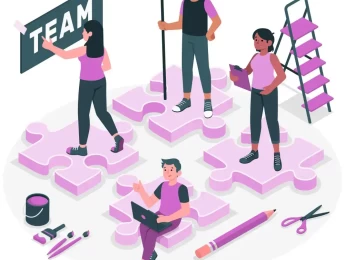There are many different skills to learn that will help in a workplace environment, from confidence to negotiation to assertiveness. All these skills are required to become a good leader and role model to a team. They will assist in motivating your workforce to achieve a collective goal and catch the attention of partners and stakeholders to secure investment.
To be a good communicator, you will need to address effective body language, enhance your negotiation skills and perform active listening to gain buy-in and take on feedback from your team. A good communicator can move forward with their ideas, gaining the confidence of others, but also take a step back to listen to the ideas of others to help improve the department and make necessary changes.
Great leaders are there to work for their teams, support them when something goes wrong, and pick them up when they lack motivation. This means you’ll need to enact an open-door policy to ensure your team feels happy and confident in approaching you with an open and honest communication style. You will need to know about problems before you can resolve them, and good communication is the key to finding out what needs to improve in your department.
Upon completion of this course, participants will be able to:
- Be more confident, authentic, and effective with your communication skills while still working on improving them.
- Use positive, engaging, and direct language.
- Be able to present yourself more professionally in front of audiences.
- Be self-assured in senior meetings or in taking control of negotiations.
- Persuade and convince others to gain recognition and support from your peers.
- Manage up, down, and sideways and confidently present your ideas.
- Create an open-door policy to ensure your employees feel confident approaching you.
- Develop your active listening skills and take on feedback to enact change.
This course is designed for anyone who intends to progress or needs to improve communication within their own team. It would be most beneficial for:
- Operations Managers
- Marketing Managers
- Directors
- Media Professionals
- Account Executives
- Public Relations Officers
- Senior Executives
- Customer Service Representatives
- Sales Personnel
- HR Personnel
This course uses various adult learning methods to aid understanding and comprehension. Participants will participate in group discussions regarding communication difficulties, review real-world case study examples of effective communication, and view trainer-led presentations regarding communication techniques.
A role-playing activity will allow participants to practice their communication and negotiation skills, and a teamwork exercise will be conducted to determine a forward-thinking action plan.
Day 5 of each course is reserved for a Q&A session, which may occur off-site. For 10-day courses, this also applies to day 10
Section 1: Leadership-Developing & Respect
- What is authenticity?
- Learning to be more assertive and emotionally intelligent.
- Reading the body language of the audience and giving confident signals.
- The art of actively listening and asking the right questions.
- Satisfying clients’ needs.
- Give and receive constructive criticism or feedback.
Section 2: Speaking Loud and Clear
- Learning to think and speak clearly and logically.
- Telling stories can be the most successful teaching tool.
- Communication team building exercise.
- Persuasion: The pillars.
- Providing a strong example of a perfect leader, where others are influenced by your decisions.
- How to deal with challenges healthily and effectively in a productive manner.
Section 3: Ideas, Delivering Reports & Proposals
- SMART targets and a straightforward brief.
- Adjust your reports for your purpose and audience.
- Creating a sensible flow and structure.
- Signposts to help make things look more professional.
- Structured ideas that are concise and readable.
- Excellent convincing via visuals-charts and graphics to prove your professionalism.
Section 4: Meetings & Negotiations
- Learning an easier and more effective way to manage time and agenda.
- How self-confidence can help when conversing with higher authority.
- Dealing with difficult people in a professional manner.
- How to properly manage conflict.
- Developing win-win solutions.
Section 5: Persuasive Presentations
- Properly analysing your body language.
- Creating mind maps to add structure to your planning.
- Projecting your voice.
- Asserting yourself with confidence.
- Handling questions professionally with ease.
- Develop a personal action plan for your department.
Upon successful completion of this training course, delegates will be awarded a Holistique Training Certificate of Completion. For those who attend and complete the online training course, a Holistique Training e-Certificate will be provided.
Holistique Training Certificates are accredited by the British Assessment Council (BAC) and The CPD Certification Service (CPD), and are certified under ISO 9001, ISO 21001, and ISO 29993 standards.
CPD credits for this course are granted by our Certificates and will be reflected on the Holistique Training Certificate of Completion. In accordance with the standards of The CPD Certification Service, one CPD credit is awarded per hour of course attendance. A maximum of 50 CPD credits can be claimed for any single course we currently offer.
- Course Code MG2-126
- Course Format Classroom, Online,
- Duration 5 days













